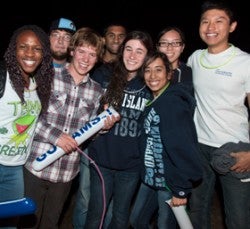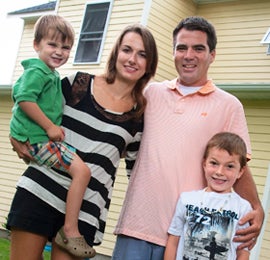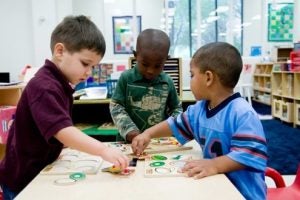Faculty in Human Development and Family Science engage in research related to individual and family wellness across the lifespan.
HDF also houses two clinics, The Child Development Centers and the Couple and Family Therapy Clinic, that regularly invite faculty from across the university to host research projects.
HDF faculty work in collaboration across three primary research themes:
Individual and Family Wellness

Dr. Sue Adams’ research explores the connections among sleep, physical, psychological, and social functioning. Her current research explores the impact of sleep disruption on students’ sleep quality, physical health, and psychological well-being (anxiety and depression). A secondary line of scholarship includes state workforce transformation efforts, with a focus on promoting high quality early child education and care among providers working with young children. Her research is supported by the RI Department of Human Services and the Rhode Island Association for the Education of Young Children.

Dr. Katie Branch’s research centers emerging and early adulthood, with an emphasis on the well-being of college students. She focuses on sociocultural college student diversity; systemic, environmental influences on adult development, especially in higher education settings; and college student engagement and success. She has expertise in qualitative inquiry and its associated research methods, including the use of photographic images as participant-generated visual data. Her work received support from ACPA-College Student Educators International.
Dr. Jessica Cless is interested in the development of trauma-informed systems including trauma-informed pedagogy as well as the impact of exercise behaviors on recovery from traumatic experiences. The Stress, Trauma, and Relational (STAR) Health Lab aims to identify overlaps of traumatic stress and overall health and well-being that can be used to inform future research, clinical interventions, and trauma-informed systems.

Dr. Tiffani Kisler’s research explores the effects of sexual aggression and other social exchanges on intimate relationships. Her work has explored the use of technology (e.g., sexting) on psychological, sexual, and relational health. Dr. Kisler also is studying how intimate partner violence among college women influences their mental health.
Dr. Nilton Porto’s research focuses on financial decision-making, consumer behavior issues, and financial well-being. He is a research affiliate for the Center for Financial Security, UW – Madison and faculty affiliate for the Social Policy Institute, Washington University in St. Louis. His research has received support from the National Endowment for Financial Education, NIFA and Real Jobs RI.
Dr. Jing Xiao’s research focuses on the development of financial capability overtime and across cultures and its association with financial well-being. Recent studies have focused on financial development of young adults and the link between financial capability and life satisfaction over the lifespan. Dr. Xiao is currently collaborating with scholars in the U.S. and Asia to examine consumer financial capability and well-being.
Infant, Child & Adolescent Development

Dr. Sammy Ahmed’s program of research focuses on understanding how classroom and peer contexts promote children’s cognitive development during the early years of schooling. He is currently involved in a research-practice partnership with the HighScope Educational Research Foundation to study how preschool curricular enhancements can promote children’s executive function development. In addition to conducting experimental research in school-based settings, Dr. Ahmed uses large scale data sets to understand children’s learning and development from early childhood through adulthood.
Dr. Hans Saint-Eloi Cadely’s research focuses on the prevalence of dating violence among adolescents and young adults. His work examines change in such behaviors throughout the transitional period of adolescence to young adulthood and factors that contribute to dating violence among this population. Dr. Cadely’s research also focuses on the significance of identity development on adolescent and young adults romantic relationships
Dr. Casey McGregor’s research focuses on processes within families with young children. She is most interested in the connections between societal messages parents receive about “good” parenting, parenting decisions, co-parenting dynamics, promotion of children’s autonomy, and young children’s developmental outcomes. For example, she is currently investigating how modern hyper-parenting attitudes, called intensive parenting, are impacting the way families interact, make decisions, and function. Her second line of research, supported by the Executive Office of Health and Human Services in Rhode Island and the Paul V. Sherlock Center on Disabilities at Rhode Island College, involves families of children enrolled in early intervention services. Specifically, Dr. McGregor is investigating inequitable outcomes amongst children in Early Intervention in RI, as well as family stress, coping, and resilience processes.
Healthy Aging in Adulthood
Dr. Melanie Brasher’s research focuses on the impact of economic disparities, social support, and community context on the health and well-being of older adults in China. Her dissertation research examined the impact of family ties and economic resources on the receipt of support and the health of older adults across communities in China at different levels of economic development. Dr. Brasher is involved in collaborative research with public health researchers at the Chinese Center for Disease Control and Prevention.
Dr. Skye Leedahl’s research centers on strengthening services and policies to better address the needs of the growing older adult population. In particular, she has investigated methods to improve social integration of older adults in long term care settings. She uses quantitative and qualitative methods to evaluate the impact of programs and interventions in addressing the social and health needs of older adults.
Dr. Cindy Tsotsoros‘ program of research focuses on aging in the neurological, developmental, and biopsychosocial correlates of cognition. Specifically, she conducted data collection to understand how adverse events, including experiences of abuse, neglect, and household dysfunction impact the plasticity (e.g., neurotrophins) and neuropsychological performance (e.g., executive function) of our brains as we age. She trains students to use various tools and skill sets in the service of psychological research, such as laboratory stress tasks, biomarker collection and analysis, cognitive assessments, biometric screenings, body composition analysis, routine health screenings, and empirically-validated questionnaires. She uses quantitative methods to identify mechanisms of cognitive impairment that result from health and environmental factors.
